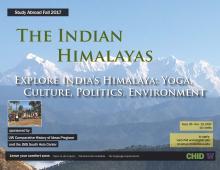Nainital, India
The 2017 Autumn Quarter UW India Himalaya Study Abroad Program provides an exploration of the society, culture, politics and economics of a rural mountainous location in India's Uttarakhand state. This area is in the midst of dramatic social, environmental and economic change as a largely subsistence economy is impacted by a privatized, commercial economy driven by regional, national and international forces.
The academic emphasis of this program is structured by two courses exploring different aspects of this environment. The political economy course will focus on political and economic transformation, and raise questions of democracy, equity, diversity, gender and socio-economic disparities in Uttarakhand and in India more broadly. Our engagement with these issues will include visits to relevant locations and interactions with activists, politicians, local figures, educators, and government representatives who are part of the vibrant local community, as well as part of the outside community we will meet during travel and excursions.
The second course will center on the rapidly changing society and culture, as wider belief systems impacted by politics complicate local practices. Students will study the past and present of the region’s cultural, social, and religious life through visits to religious sites, interactions with religious figures, and engaging with texts and ethnographies. A key experiential aspect of this course is daily yoga instruction along with lectures on the philosophical aspects of yoga, taught in the very home of ancient yoga itself, set amid the glorious Himalayan mountains.
Students can then draw on this academic framework to embark on “learning service” in structured volunteer activities with organizations in the region. The intersection of the local with on-going changes is mediated by NGOs and private undertakings, an examination of which will provide an in-depth look at changing gender relations, evolution of expectations, environmental impact and impact on cultural practices.
Among the organizations we volunteer with are: Aarohi, a not-for-profit grassroots organization focused on integrated rural development with emphasis on healthcare, education, livelihoods and preservation of traditional culture; the Gene Campaign, a research and advocacy organization focused on food security, traditional seed preservation and livelihoods; and the Central Himalayan Rural Action Group (CHIRAG), which is the oldest organization working with communities in the Kumaun region on integrated rural development, including education, forestry, soil and water conservation, agriculture, animal husbandry, preventive and promotive health, and livelihoods and micro-enterprise support. Volunteering and “learning service” extend to our regional excursions to Lakshmi Ashram, a girl’s residential school in the Gandhian tradition, village Jageshwar, a religious pilgrimage site and village Munsiyari where the high Himalayan peaks rise skyward!
Students are housed and based at Himalayan Village Sonapani, a sylvan retreat at village Satoli. After the first two weeks, students join area families for home stays where they will be immersed in the daily routines, work, culture, and rituals of the host community. Weekends at Sonapani have the students engaging with eminent visiting scholars, specialists in the Himalayan region, accomplished yoga practitioners, artists, filmmakers, musicians, and dancers.
Students who participate in this program come from diverse backgrounds and a range of majors from business to public health to anthropology. Opportunities abound for students to direct their studies and experiential learning choices to enrich their learning in the direction of their specific interests. Not-for-credit Hindi language study is readily available and provides excellent groundwork for interactions in homestays, with the Sonapani staff, and with other Hindi speakers that students will encounter.
- JSIS 417 / CHID 474A: Society, Politics, and Development in India (5 credits)
- JSIS 485 / CHID 474B: Yoga, Religion, Society, and Culture in India (5 credits)
- JSIS 497 / CHID 399: Experiential Learning: Environment and Social Change in India's Himalaya (5 credits)
*Note that the fees stated above do not include some additional costs, including, but not limited to: airfare, Study Abroad Insurance ($2/day), and personal spending money. Remember that these costs will differ by program. Be sure to read our Fees, Financing, and Withdrawal information for details about the fee structure and payment schedule.
